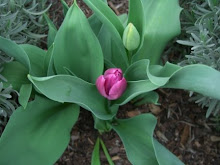Linford Detweiler, of the band Over the Rhine, was the first writer to convince me that non-fiction could be beautiful and interesting. (I even got to tell him so once, and he appeared to actually care.) He did this through his folky, idiosyncratic autobiographical writing in which faith, landscape, and art merge with the self. And now, he's done it again:
"The thing about music is, you either feel it or you don't. And for whatever reason, when I sat down at the piano and Karin [his wife] opened her mouth, the room changed. We didn't plan it that way. It's just that the first time we performed together, people felt something on their skin and wanted to know what had happened, because it felt different somehow. All of a sudden we were feeling a bit shy. We didn't know what had happened, and Karin and I went our separate ways not long after we graduated. But I think that chemical reaction was lurking in the back of our minds."
A perfect metaphor for the tangibility of human connection. You can find the entire article, "Only in America: The Trumpet Child's Autobiography," in the November '07 issue of Paste, and Over the Rhine's new album, The Trumpet Child, in stores now.
Thursday, November 08, 2007
Sunday, November 04, 2007
"The Women's Movement has ruined you, Marianne."
One of my professors actually said this to me the other day. In case you were wondering, the professor is a man--an older man in his sixties, who dedicates himself to dressing (unironically???) like a cowboy every day. Many of us have also decided that he has serious issues with women, as can be illustrated by the quote above.
Ever since I started my MA at Duquesne in 2003, this professor and I have engaged in an intermittent battle of wills and wits that has played out largely in the context of elevators: it's amazing how many witticisms can be exchanged between the second and sixth floors of College Hall.
Last year this battle intensified. A week into the fall semester, I realized I had the same schedule as this professor. Not only that: we taught in neighboring classrooms in buildings across campus. So, I often found myself walking with him to and from class. He did most of the talking. I would listen bemusedly most of the time, but sometimes I actually felt some pity for him: here he was, a few years from retirement, completely jaded and quite obviously certain that he had made little to no impact on students during the course of his career. And I became empathetic to the degree that I sometimes thought, "God, will this be ME in forty years?!"
But then we engaged in a pointless but furious battle of wills that led me to retract most of the empathy he had worked up in my hardened heart.
We began arguing over which route we would take back to our building after class. Imagine, if you will, a petite, young-looking graduate student squaring off against an older man in cowboy attire over whether we would take the direct route or the circuitous route that led past a university construction project. He became bizarrely insistent that I walk with him past the new building; I, in return, became equally insistent that we take the direct route.
Nobody really won: I went my way, he went his. This parting ended the battle for a while.
But now I'm in his class, and from the very first night I have been that obnoxious student who asks too many questions in a manner that borders on disrespectful. I am the opposite of demure, and I strongly suspect that he prefers demure women.
This preference of his became apparent during our next pointless battle, which took place in front of the microwave in the graduate office, i.e., MY office. I was in the process of microwaving a frozen dinner of some sort, and had realized that it needed to cook for another minute. Just as I placed the dish back in the microwave, I caught a whiff of cigarettes, whiskey, and stale coffee. Guess who? It was him, and he wanted to nuke his coffee. He insisted that I let him budge in front of me. I, of course, was equally insistent that he must wait, and pushed "start."
And that's when he said it, that thing about the "Women's Movement" ruining me.
(Seriously, who calls it that anymore???)
He says things like this to be controversial, the token misogynist in a department filled with feminists. Knowing this, I simply replied, "No, actually, I blame my father for that."
This statement, while a quip, holds quite a bit of truth. I've inherited most of my personality traits from my dad, so if my personality sucks, it's his fault, right? And then there's the whole 16 years in prison and unexpected death. Could these things count as "ruining" me?
Well, I guess that depends on what "ruining" means. In this professor's opinion, "ruining" appears to mean making a feminine-looking girl act in a way that traditional western society has dubbed "masculine": being stubborn, independent, assertive. And yes, I admit, rather bossy, snide, and aggressive from time to time.
Blaming this on feminism, though, is a fallacy. Yes, I am a feminist. Is this status responsible for my personality? Um, no. Does it keep me from repressing my personality? Sure. Isn't that called social progress? Does social progress ruin a person? As a Liberal, I answer that question with a resounding NO.
A-hem. Okay, I admit, I am beginning to sound strident. But, seriously Professor X. Stop being a dick.
Ever since I started my MA at Duquesne in 2003, this professor and I have engaged in an intermittent battle of wills and wits that has played out largely in the context of elevators: it's amazing how many witticisms can be exchanged between the second and sixth floors of College Hall.
Last year this battle intensified. A week into the fall semester, I realized I had the same schedule as this professor. Not only that: we taught in neighboring classrooms in buildings across campus. So, I often found myself walking with him to and from class. He did most of the talking. I would listen bemusedly most of the time, but sometimes I actually felt some pity for him: here he was, a few years from retirement, completely jaded and quite obviously certain that he had made little to no impact on students during the course of his career. And I became empathetic to the degree that I sometimes thought, "God, will this be ME in forty years?!"
But then we engaged in a pointless but furious battle of wills that led me to retract most of the empathy he had worked up in my hardened heart.
We began arguing over which route we would take back to our building after class. Imagine, if you will, a petite, young-looking graduate student squaring off against an older man in cowboy attire over whether we would take the direct route or the circuitous route that led past a university construction project. He became bizarrely insistent that I walk with him past the new building; I, in return, became equally insistent that we take the direct route.
Nobody really won: I went my way, he went his. This parting ended the battle for a while.
But now I'm in his class, and from the very first night I have been that obnoxious student who asks too many questions in a manner that borders on disrespectful. I am the opposite of demure, and I strongly suspect that he prefers demure women.
This preference of his became apparent during our next pointless battle, which took place in front of the microwave in the graduate office, i.e., MY office. I was in the process of microwaving a frozen dinner of some sort, and had realized that it needed to cook for another minute. Just as I placed the dish back in the microwave, I caught a whiff of cigarettes, whiskey, and stale coffee. Guess who? It was him, and he wanted to nuke his coffee. He insisted that I let him budge in front of me. I, of course, was equally insistent that he must wait, and pushed "start."
And that's when he said it, that thing about the "Women's Movement" ruining me.
(Seriously, who calls it that anymore???)
He says things like this to be controversial, the token misogynist in a department filled with feminists. Knowing this, I simply replied, "No, actually, I blame my father for that."
This statement, while a quip, holds quite a bit of truth. I've inherited most of my personality traits from my dad, so if my personality sucks, it's his fault, right? And then there's the whole 16 years in prison and unexpected death. Could these things count as "ruining" me?
Well, I guess that depends on what "ruining" means. In this professor's opinion, "ruining" appears to mean making a feminine-looking girl act in a way that traditional western society has dubbed "masculine": being stubborn, independent, assertive. And yes, I admit, rather bossy, snide, and aggressive from time to time.
Blaming this on feminism, though, is a fallacy. Yes, I am a feminist. Is this status responsible for my personality? Um, no. Does it keep me from repressing my personality? Sure. Isn't that called social progress? Does social progress ruin a person? As a Liberal, I answer that question with a resounding NO.
A-hem. Okay, I admit, I am beginning to sound strident. But, seriously Professor X. Stop being a dick.
Thursday, November 01, 2007
My not-so-secret garden
My garden saved my life.
Really, it did.
As I've discussed a few times on this blog, this year has been Marianne's Mental Health Year. After a decade (or more, let's just be honest) of avoidance, I decided to give up the internal battle and discuss my deepest insecurities and shame with a fantastic cognitive psychologist named Dr. Friday. (Doesn't he sound like a comic book character?) Therapy, definitely, has saved my life.
But my garden has, too. Investing a lot of time and physical effort and psychic energy in PLANTS can really help one work through anxiety and depression. And while therapy is amazing, the intensity of each session can often leave one...at loose ends for a day or two. Work--mindless work--is the best solution.
So, in April, I built and planted a garden from scratch in my teeny tiny Southside back yard. I ripped up about fifty years' worth of weeds and sod and garbage, added some new soil, installed a weed barrier, and stuck A LOT of baby plants in the ground. In the process, I also discovered and uncovered an old brick patio that had been neglected for so long that it had completely disappeared beneath three to five inches of weeds and soil.
I wasn't really sure if the plants would live. After all, the soil around my house has probably been contaminated by years of soot from the steel mill that used to be two blocks away. And, I've never really gardened on my own before: I used to "help" my grandparents with their gardens, but that was years ago. Still, I went out to check on the plants every day, watered them, fertilized them, pruned them, and they grew. And grew. And grew.
To be honest, I have been pretty obsessed with my garden all summer, and I pour a lot of emotional energy into it. I even blush a little when friends and neighbors compliment it. It's a big accomplishment for me, and I actually take pride in it.
Taking pride in something I've created is a novel concept for me. As Dr. Friday has forced me to admit, I have always regarded my creations as inadequate, and therefore, I've been a bit ashamed of them. In fact, when I have found myself in a particularly forceful fury of perfectionism, my projects and their "glaring" faults seem to exemplify my inadequacies as a person.
This is why I'm in therapy.
But my garden (and Dr. Friday, of course) has changed this unfortunate negative thought pattern. And, in celebration of newfound self-esteem, I've posted photos of the garden as it has evolved through the summer and into fall.
In case you're interested, the back flower bed includes Siberian iris, osteospermum, "dusty miller," "hens and chicks," marigolds, and Scottish moss. The side herb gardens include basil (purple and green), dill, cilantro, rosemary, oregano, and a monstrous grape tomato plant. The front gardens consist solely of French lavender bushes and double petunias.
BTW: After three frosts, most of the plants are still thriving. Also, I'm in the process of planting spring-blooming bulbs: tulips, daffodils, and hyacinths (in memory of Eliot's "the hyacinth girl"). The tulips--tall purple and dwarf orange--have been planted in the front beds; the daffodils and hyacinths will be planted in the back.
Really, it did.
As I've discussed a few times on this blog, this year has been Marianne's Mental Health Year. After a decade (or more, let's just be honest) of avoidance, I decided to give up the internal battle and discuss my deepest insecurities and shame with a fantastic cognitive psychologist named Dr. Friday. (Doesn't he sound like a comic book character?) Therapy, definitely, has saved my life.
But my garden has, too. Investing a lot of time and physical effort and psychic energy in PLANTS can really help one work through anxiety and depression. And while therapy is amazing, the intensity of each session can often leave one...at loose ends for a day or two. Work--mindless work--is the best solution.
So, in April, I built and planted a garden from scratch in my teeny tiny Southside back yard. I ripped up about fifty years' worth of weeds and sod and garbage, added some new soil, installed a weed barrier, and stuck A LOT of baby plants in the ground. In the process, I also discovered and uncovered an old brick patio that had been neglected for so long that it had completely disappeared beneath three to five inches of weeds and soil.
I wasn't really sure if the plants would live. After all, the soil around my house has probably been contaminated by years of soot from the steel mill that used to be two blocks away. And, I've never really gardened on my own before: I used to "help" my grandparents with their gardens, but that was years ago. Still, I went out to check on the plants every day, watered them, fertilized them, pruned them, and they grew. And grew. And grew.
To be honest, I have been pretty obsessed with my garden all summer, and I pour a lot of emotional energy into it. I even blush a little when friends and neighbors compliment it. It's a big accomplishment for me, and I actually take pride in it.
Taking pride in something I've created is a novel concept for me. As Dr. Friday has forced me to admit, I have always regarded my creations as inadequate, and therefore, I've been a bit ashamed of them. In fact, when I have found myself in a particularly forceful fury of perfectionism, my projects and their "glaring" faults seem to exemplify my inadequacies as a person.
This is why I'm in therapy.
But my garden (and Dr. Friday, of course) has changed this unfortunate negative thought pattern. And, in celebration of newfound self-esteem, I've posted photos of the garden as it has evolved through the summer and into fall.
In case you're interested, the back flower bed includes Siberian iris, osteospermum, "dusty miller," "hens and chicks," marigolds, and Scottish moss. The side herb gardens include basil (purple and green), dill, cilantro, rosemary, oregano, and a monstrous grape tomato plant. The front gardens consist solely of French lavender bushes and double petunias.
BTW: After three frosts, most of the plants are still thriving. Also, I'm in the process of planting spring-blooming bulbs: tulips, daffodils, and hyacinths (in memory of Eliot's "the hyacinth girl"). The tulips--tall purple and dwarf orange--have been planted in the front beds; the daffodils and hyacinths will be planted in the back.
Subscribe to:
Posts (Atom)




